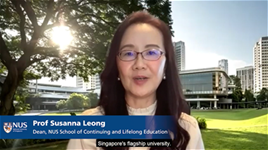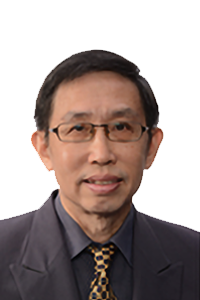COURSE OBJECTIVES
Innovation and sustainability in the urban environment are needed to ensure that modern societies continue to function, thrive, and advance further. The objective of this programme is to provide an overview of the city of the future from the perspectives of infrastructure, design, as well as environmental management with focus on water and waste. Upon completion of the programme, students will have a better appreciation of the role of civil and environmental engineers in projecting today’s society into the future.
PROGRAMME HIGHLIGHTS

|
 |
| Welcome message from Dean of NUS SCALE |
Tutorials conducted over Zoom |
Who Should Attend
Undergraduate students majoring in civil/environmental engineering.
Pre-Requisites
There is no pre-requisite for this course.
Programme Schedule
For individuals interested in NUS SCALE Youth programmes, please click here to enquire.
For schools/companies interested in customised and/or group bookings, please click here.
Mode of Delivery
Synchronous Online Programme: 18 hours of online programme, including synchronous lessons, tutorials and a final project presentation; On-campus Programme: 15 hours of face-to-face teaching.
Mode of Assessment
Students will be assessed via a variety of assignments and assessments:
- Quiz
- Group Presentation
COURSE INSTRUCTORS
Below are the faculty members who have developed the course, and taught the programme in the past (names are arranged in alphabetical order):
Dr Ooi Seng Keat
Senior Lecturer, Department of Civil and Environmental Engineering,
Faculty of Engineering
Dr Ooi Seng Keat (SK) is a senior lecturer at the Dept. of Civil and Environmental Engineering and Head of the Ecological Monitoring, Informatics and Dynamics group at the Tropical Marine Science Institute at the National University of Singapore. Before joining NUS in 2008, SK worked as a project engineer on Pulau Tekong, and as a research assistant as well as a research associate at IIHR Hydroscience & Engineering.
SK’s research interests are in the issues associated with tropical environmental flows particularly inputs and interactions between the biota and the environment and how to model them. The implications of these interests lie in the domain of the potential impact in light of the changing climate and rapidly changing built-environment to water resources issues especially flows, water quality and ecology in the tropics which are not always well described.

Dr. Pang Sze Dai
Associate Professor, Department of Civil and Environmental Engineering,
Faculty of Engineering
A/Prof. PANG Sze Dai graduated from the National University of Singapore with B.Eng. (First Class Honours) and M.Eng. degrees in 2001 and 2002 respectively under the Accelerated Master’s Program (AMP), and from the Northwestern University with Ph.D. degree in 2005. He researched on the behaviour of profiled steel-concrete composite structures subjected to blast loading for his M.Eng thesis and on the size effect arising from energetic and probabilistic fracture mechanics in the mechanical properties of quasi-brittle materials for his Ph.D dissertation.
Dr. Pang is currently working on research in the area of protective building and sustainable building technologies using principles from bio-mimicry and is also researching on the size effect in cementitious and metal matrix composites. He has attracted close to S$3 million in research funding as Principle Investigator and collaborator. He has served on the committees for a number of major conferences, reviewed for multiple journal articles and also served as external reviewer for national research projects. He has also provided his expertise to the industry for consultations on structural dynamics, steel structures and seismic engineering.

Chan Weng Tat
Associate Professor, Department of Civil and Environmental Engineering,
Faculty of Engineering
A/Prof CHAN Weng Tat graduated from the University of Singapore with BEng (1st class) in 1980 and MEng in 1981. He completed his graduate studies under a NUS scholarship at Stanford University where he obtained his MSc in Construction Management in 1982 and his PhD in 1986 with a dissertation on the application of constraint logic programming for managing design consistency.
Prof Chan, an associate professor at the National University of Singapore, teaches construction management and infrastructure systems subjects. He holds a joint appointment with the Department of Industrial & Systems Engineering Management, and is a key member of the Engineering Systems Initiative (ESI), an inter-department task force of the Faculty of Engineering set up to formalize research and educational efforts in the understanding, designing and managing large-scale complex technological systems. A key outcome of ESI was the launch of the MSc program in Systems Design & Management (SDM) in 2006. Professor Chan serves as the Program Manager of the SDM Program.
Prof Chan was the first engineering co-Director of the NUS-JTC Industrial Infrastructure Innovation Centre. The centre, launched in 2011, is a collaborative effort between JTC and NUS (School of Design & Environment and Faculty of Engineering) to promote the development of innovative and sustainable industrial infrastructure solutions in Singapore.

Dr Olivier Patrick Lefebvre
Assistant Professor, Department of Civil and Environmental Engineering,
Faculty of Engineering
Dr Olivier LEFEBVRE’s research work is mainly in the fields of electrochemical technologies, advanced oxidations processes, industrial wastewater treatment and water reuse. He is also an adjunct Professor at the Research Institute of Mines and Environment of the University of Quebec in Abitibi-Témiscamingue (UQAT). Olivier is an editor for Water Science & Technology and an IWA Fellow, administrator, newsletter editor and webmaster for the specialist group on water reuse, within the International Water Association (IWA).
An agronomic engineer by formation, Olivier obtained his Ph.D. from Supagro Montpellier in 2005, on a collaborative work between the Narbonne laboratory of the French National Research Institute for Agricultural Research (INRA) and the Anna University in Chennai, India. The topic was related to biological treatment of tannery wastewater.
Olivier is a Fellow of the NUS Teaching Academy and a recipient of multiple research and teaching awards.
COMMENDATION LETTER
Participants from the project team with the highest score for the group project will also receive a commendation letter.